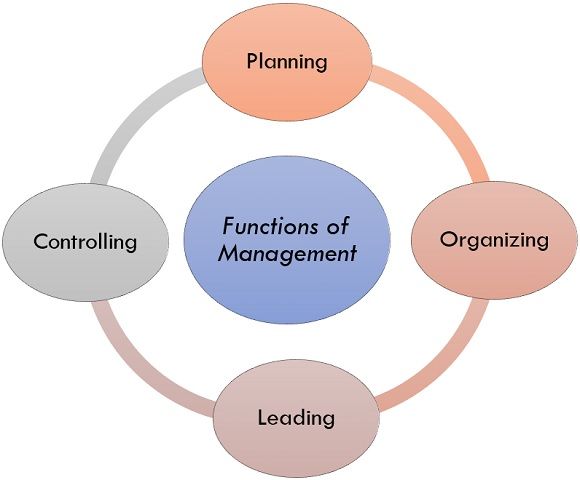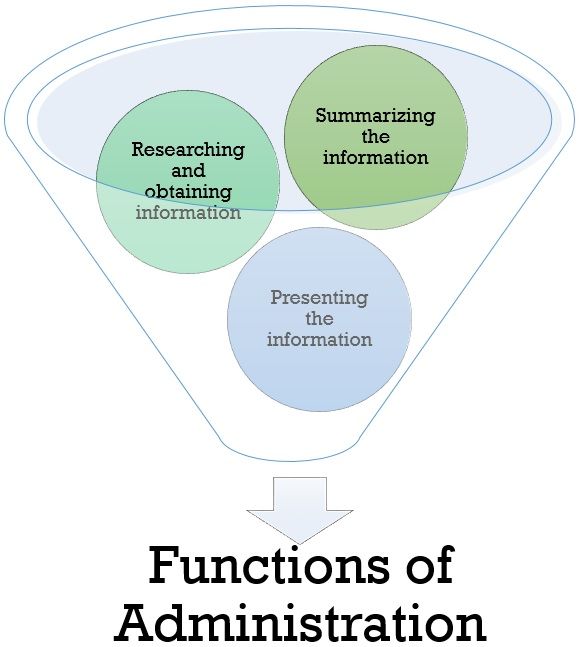Management and Administration both are the significant functions of any business organization. However, there are certain arguments that arise amidst the two correlated terms. According to various management writers, both of them are identical and can be used conversely but the major difference exists in their use in relation to distinct areas of human activities. In the initial stage of management evolution, both the management and the administration were treated equivalent. But in 1923, “Oliver Sheldon” discriminated among the two. He related administration with decision making and management with operation function.
At present, there are three points of view on the subject. They are as follows:
- Administration is Beyond Management: Few European thinkers are of the belief that administration is beyond management. Both are participating in various activities, though one and the others are carried out by the same entity in the company. Administration is mainly interested in the formulation of policies, although management is involved in the execution of the policies.
- Administration is a Unit of Management: This approach recognizes administration as a unit of management. According to this path, management is an extensive term consisting of a number of functions along with some administrative functions. Here, administration manages routine periodic functions although management is involved with the policy creation function.
- Administration and Management are Equivalent: This is the most prominent and practical approach to evaluate the kind of relationship among them. Various famous management contributors counting Henry Fayol, George R Terry do not recognize any difference amidst the management and the administration. Both contain similar functions, processes, and principals and chases the same targets.
The distinction between management and administration can be outlined below in the table of difference and comparison.
Content: Management Vs Administration
- Difference and Comparison
- What is Management?
- Functions of Management
- What is Administration?
- Functions of Administration
- Summary
- Conclusion
Difference and Comparison
| Basis of Comparison | Management | Administration |
|---|---|---|
| Introduction | It is an art of taking work from other individuals by giving directions to them. | It implies complete perseverance of the plans and policies of the enterprise. |
| Structure | Structure of management is of executive nature. | Administration's structure is of deterministic nature. |
| Extent | Management is exacting the discharge of policies. | Administration is exacting the assurance of primary objectives and policies. |
| Position | Management is a low and middle-ranked function. | Administration is a high ranked function. |
| Authority | Decisions of the management are controlled by aims and policies of an enterprise. | Administrative decisions are controlled by a common belief and other outside forces. |
| Management of human exertion | Precisely it is not concerned with the management of human exertion. | It is seriously concerned with the control of human resolution in the accomplishment of the plan. |
| Procedure | Management concludes the distribution of work amidst various employees and how it is to be done. | Administration concludes what work is to be allocated to the distinctive employees of the enterprise. |
| Objectives | Supervising and coordinating are the primary objectives of the management. | Planning and regulating are the major objectives of the administration. |
| Proficiency | Professional and personal proficiency is required in it. | Visionary and personal proficiency is needed in it. |
| Control | Management mainly have control over business concerns. | Administration has a control in government or national sectors. |
What is Management?
Management is a definite process that comprises of various functions of an organization. Appropriate management helps in ascertaining and achieving the goals of the organization with the help of people and resources. In other words, it is a procedure of accomplishing managerial objectives by captivating in the four main functions of the organization, i.e., organizing, planning, controlling and leading by the governance of technological, human, material and financial resources.
The main objective of any business concern is to transform the available material goods into superior products or services. This requires the competent and productive use of resources to get the utmost output. To obtain maximal productivity, it necessitates the ability to plan, impressive organizing, leadership traits, controlling and administrative skills.
Functions of Management
Substantial management functions can be classified into four main functions. They are as follows:

- Planning: Planning is the most essential and fundamental activity of management. The function also involves taking everything in mind what must be done to improve the necessary levels of development and innovation. On the basis of functions, there are two types of planning.
- Strategic planning: It focuses on long-range aims and the broad procedures for managing the team.
- Operational planning: It concentrates on short-range goals and the explicit means used to acquire them and on the associated managerial activity of decision making.
- Organizing: It is the management function that targets on assigning and arranging human and natural resources so that procedure can be implemented successfully. Various tasks must be allocated to diverse people, and their work must be coordinated.
- Leading: It is the management function that includes manipulating others to engage in the trade conducts mandatory to reach organizational objectives.
- Controlling: It is a management function anticipated at managing organizational actions so that substantial performance reaches the expected targets and standards of the organization.
What is Administration?
Business administration is a significant area of study that comprise all business and management activities in companies or organizations across the world. It resides the achievements or managerial operations of these organizations where business arrangements are made and achieved. It holds the key to the productive business or management remits of the staff members such as managing director, chief executive officers, company secretaries, general manager and corporate board of directors.
Several organizations have a central administration department. The major function of this department is to handle the paper-work and to assist all the other departments by administrating them with secretarial work.
For example:
- Data input
- Making phone calls
- Entering paper-work
- Handling incoming and outgoing e-mails
- Assembling information from other departments for further use
The administration section of an organization deals with various range of data and information from distinct places. The information collected is usually processed by the administrative personnel to make it beneficial for others.
Functions of Administration
Following are the substantial tasks or functions of the administration of an organization:

- Researching and Obtaining Information: This may contain seeking information on the internet or from the book repository or the reference books.
- Summarizing the Information: This manages the form of learning something and then demonstrating it in a more compact or reduced form.
- Presenting the Information: Administration workers have to be experienced about the methods in which the business chooses to submit information. The advice can be conferred in a various number of methods containing letters, memos, reports, notices or articles.
Summary
- Management is an art of taking work from other individuals by giving directions to them. However, Administration implies complete perseverance of the plans and policies of the enterprise.
- Structure of management is of executive nature. However, Administration’s structure is of deterministic nature.
- Management is exacting the discharge of policies. However, Administration is exacting the assurance of primary objectives and policies.
- Management is a low and middle-ranked function. However, Administration is a high ranked function.
- Decisions of the management are controlled by the aims and policies of an enterprise. However, Administrative decisions are controlled by a common belief and other outside forces.
- Precisely, it is not concerned with the management of human exertion. However, Administration is seriously concerned with the control of human resolution in the accomplishment of the plan.
- Management concludes the distribution of work amidst various employees and how it is to be done. However, Administration concludes what work is to be allocated to the distinctive employees of the enterprise.
- Supervising and coordinating are the primary objectives of the management. However, planning and regulating are the major objectives of the administration.
- Professional and personal proficiency is required in it. However, visionary and personal proficiency is needed in Administration.
- Management mainly has control over business concerns. However, Administration has control in government or national sectors.
Conclusion
It can be concluded that designing and accomplishing are two major functions of management, and all organizers perform them. It is enhanced to say that management executes two types of functions that includes enforcement and application of such policies.
The conflicts arise in their corresponding importance. Higher-level management involves with policy formulation, and lower-level management involves with policy implementation. The middle level has an assorted task and grand aid to both high and low levels of management. In a current scenario, various experts and management writers suggest to avoid the old-age argument and consider administration and management as the same.
zeleke himbago says
thank you